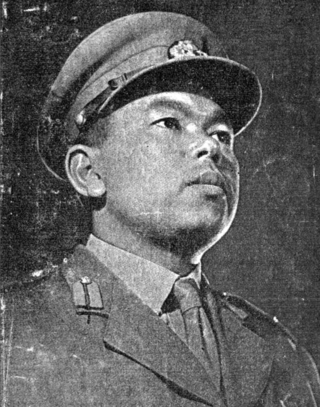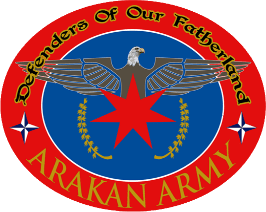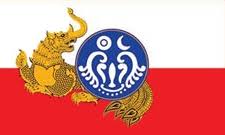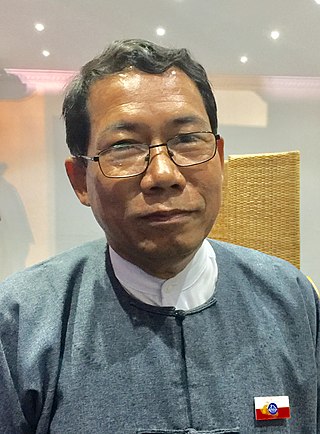The history of Myanmar covers the period from the time of first-known human settlements 13,000 years ago to the present day. The earliest inhabitants of recorded history were a Tibeto-Burman-speaking people who established the Pyu city-states ranged as far south as Pyay and adopted Theravada Buddhism.

The Anti-Fascist People's Freedom League (AFPFL) was the dominant political alliance in Burma from 1945 to 1958. It consisted of political parties and mass and class organizations.

Kyaw Zaw was one of the founders of the Tatmadaw and a member of the Thirty Comrades who trained in Japan in the struggle for independence from Britain. He was also one of the leaders of the Communist Party of Burma, and had lived in exile in Yunnan Province, China, since 1989 after retiring from politics.

The first fourteen years of independent Burma (Myanmar) were marred by several communist and ethnic insurgencies. Prominent insurgent groups during this period include the Communist Party of Burma led by Thakin Than Tun, the Communist Party (Burma) led by Thakin Soe, the People's Volunteer Organisation led by Bo La Yaung, the Revolutionary Burma Army (RBA) led by communist officers Bo Zeya, Bo Yan Aung and Bo Yè Htut, and the Karen National Union (KNU).

Insurgencies have been ongoing in Myanmar since 1948, when the country, then known as Burma, gained independence from the United Kingdom. It has largely been an ethnic conflict, with ethnic armed groups fighting Myanmar's armed forces, the Tatmadaw, for self-determination. Despite numerous ceasefires and the creation of autonomous self-administered zones in 2008, armed groups continue to call for independence, increased autonomy, or federalisation. It is the world's longest ongoing civil war, spanning almost eight decades.

The Communist Party of Burma (CPB), also known as the Burma Communist Party (BCP), is an underground communist party in Myanmar (Burma). It is the oldest existing political party in the country.

The Communist Party (Burma) (Burmese: ကွန်မြူနစ်ပါတီ (ဗမာပြည်)), sometimes referred to as the Red Flag Communist Party (Burmese: အလံနီကွန်မြူနစ်ပါတီ; RFCP), was a communist party in Burma. The party was formed after a more radical faction broke away from the Communist Party of Burma in 1946. In the same year, it began a protracted armed insurgency; first against British rule, then against the Burmese government. The party was led by Thakin Soe, a firebrand communist leader. In the 1970s, the party lost influence and was militarily defeated by 1978.

The Rakhine Nationalities Development Party was a political party in Myanmar (Burma), representing the interests of the Rakhine people in Rakhine State and Yangon Region. The party contested 44 seats in the 2010 General Election, of which it won 35. The RNDP was the largest party in the Rakhine State Hluttaw, the sole State or Region Hluttaw whose largest party was not the Union Solidarity and Development Party following the 2010 election. The party was at times accused of stirring up anti-Muslim feelings.

The Arakan Army, sometimes referred to as the Arakha Army, is an ethno-nationalist armed organisation based in Rakhine State (Arakan). Founded in April 2009, the AA is the military wing of the United League of Arakan (ULA). It is currently led by Commander-in-Chief Major General Twan Mrat Naing and vice deputy commander-in-chief Brigadier General Nyo Twan Awng. The Arakan Army states that the objective of its armed revolution is to restore the sovereignty of the Arakan people. It was declared a terrorist organization in 2020 by Myanmar, and again by the State Administration Council junta in 2024.

The Arakan National Party, is a political party in Myanmar (Burma), representing the interests of the Rakhine people in Rakhine State and Yangon Region. The party was founded on 13 January 2014 and registered with the Union Election Commission on 6 March 2014. The chairman of the ANP is Thar Htun Hla. The party is known for its hardline ethnic nationalist stance, as well as its Islamophobic and anti-Rohingya positions. Some members of the party were involved in instigating violence against Rohingya people during the communal riots in 2012, which left dozens dead and thousands homeless.
Kyaw Nyein, called honorifically U Kyaw Nyein, was a Burmese lawyer and anti-colonial revolutionary, a leader in Burma’s struggle for independence and prominent politician in the first decade after the country gained sovereignty from Britain. He held multiple minister portfolios in the government of Prime Minister U Nu, served as General Secretary of the ruling political alliance, Anti-Fascist People's Freedom League (AFPFL), and was joint General Secretary of the Burma Socialist Party (BSP).

Major General Twan Mrat Naing is an Arakanese revolutionary and commander in chief of the Arakan Army, an ethnic armed organization.

The communist insurgency in Burma was waged primarily by the Communist Party of Burma and the Communist Party (Burma) from 1948 to 1989. The conflict ended when the CPB, severely weakened by an internal mutiny, disbanded its armed wing.

The Arakan Liberation Army is a Rakhine insurgent group in Myanmar (Burma). It is the armed wing of the Arakan Liberation Party (ALP). The ALA signed a ceasefire agreement with the government of Myanmar on 5 April 2012.

The National United Party of Arakan is a political organisation and insurgent group in Rakhine State, Myanmar. It was formed in 1994 as a merger between four nationalist groups, including a faction of the Communist Party of Arakan.

Aye Maung is a Burmese politician and was the chairperson of the Arakan National Party, one of Myanmar's ethnic political parties. He is currently the leader of the Arakan Front Party. He is a staunch nationalist known for his hardline stance against the Rohingya people, having tirelessly campaigned against the minority group and having been involved in instigating attacks against them in the communal violence in 2012.

Violent clashes have been ongoing in the northern part of Myanmar's Rakhine State since October 2016. Insurgent attacks by the Arakan Rohingya Salvation Army (ARSA) have led to sectarian violence perpetrated by Myanmar's military and the local Buddhist population against predominantly Muslim Rohingya civilians. The conflict has sparked international outcry and was described as an ethnic cleansing by the United Nations High Commissioner for Human Rights. In August 2017, the situation worsened and hundreds of thousands of refugees fled Myanmar into Bangladesh, with an estimated 500,000 refugees having arrived by 27 September 2017. In January 2019, Arakan Army insurgents raided border police posts in Buthidaung Township, joining the conflict and beginning their military campaign in northern Rakhine State against the Burmese military.

The United League of Arakan is an Arakanese political organisation based in Laiza, Kachin State, Myanmar. Its armed wing is the Arakan Army. Major General Twan Mrat Naing is the ULA's chairman and Brigadier General Nyo Twan Awng is in the secretary. The United League of Arakan is the member of the Federal Political Negotiation and Consultative Committee (FPNCC), the political negotiation team formed by seven ethnic armed groups in Myanmar.

The Arakan Front Party is a political party in Myanmar seeking Arakanese self-determination and holding hardline ultranationalist, anti-Rohingya and anti-Islam stances. It was founded on 11 October 2018 by Dr. Aye Maung, former chairman of the Arakan National Party, and his colleagues, including his son Tin Maung Win.

On 13 November 2023, the Arakan Army (AA), an ethnic resistance group active in the civil war in Myanmar, launched a military offensive against Myanmar's military junta in Rakhine and southern Chin State. Fighting began concurrently with the launch of Operation 1027, which the Arakan Army, as a member of the Three Brotherhood Alliance, also participated in. The offensive broke an informal ceasefire between the Arakan Army and the junta that had been in place for a year. During the offensive, the Arakan Army captured several towns in northern Rakhine, including Mrauk U, the capital of Mrauk-U District and the historical capital of Arakan. These gains gave them total control over most of northern Arakan. The Arakan Army followed these successes by besieging Sittwe, the state capital, and Ann, the headquarters of the junta's western command. They also launched offensives in the southern parts of the state, capturing several towns and throwing junta forces into disarray. The International Institute for Strategic Studies reported that the Arakan Army's sweeping gains "are already enough to enable self-rule over a large portion of the Rakhine homeland and to reshape the wider balance of power in Myanmar."
















